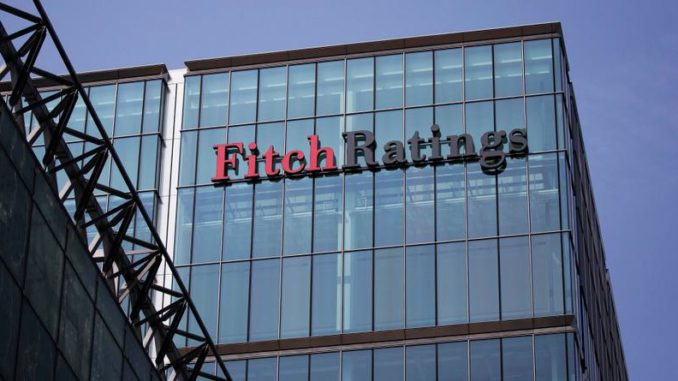Fitch Ratings has upgraded Nigeria’s Long-Term Foreign-Currency Issuer Default Rating to ‘B’ from ‘B-‘, reflecting a stable outlook for the country’s economy. A key driver of this upgrade is the robust profitability of Nigerian banks, which Fitch believes can absorb the impact of the recently implemented windfall tax. This tax, levied on banks’ profits from the 2023 naira devaluation, resulted in six major banks paying a combined total of approximately N205.59 billion. Despite this substantial sum, Fitch’s analysis indicates that the tax burden is manageable given the banks’ strong financial performance. Furthermore, Fitch anticipates that the banking sector will navigate the challenges posed by rising non-performing loans, driven by high inflation and interest rates. While acknowledging the potential increase in impaired loans due to the lifting of forbearance measures, the relatively small size of loan books (35% of total assets) should mitigate the overall impact on banks’ performance. Fitch also notes the ongoing efforts by Nigerian banks to raise capital in compliance with higher minimum paid-in capital requirements set by the Central Bank of Nigeria (CBN), suggesting the possibility of mergers and acquisitions among smaller banks.
Fitch’s positive outlook for Nigeria is further supported by the CBN’s efforts to reduce foreign exchange (FX) liabilities and bolster its net reserves. While acknowledging a lack of detailed information on the composition of reserves, Fitch estimates that FX swaps with local banks account for approximately 14% of gross reserves, down from 25% in a previous assessment. This reduction suggests the CBN’s active management of FX liabilities and its commitment to strengthening its reserves position. The rating agency projects a widening budget deficit for 2025-2026, averaging 4.2% of GDP, primarily due to increased expenditure on wages, social and security programs, debt servicing, and election-related activities. However, Fitch anticipates that non-oil tax revenue reforms will boost government revenue, albeit with potential political and implementation challenges. Despite this increase, general government revenue is expected to remain structurally low, contributing to a high general government interest-to-revenue ratio. The availability of ample liquidity within the banking sector and strong demand for government securities is expected to support domestic financing capacity.
Nigeria’s public debt trajectory also contributes to the stable outlook. Fitch projects a marginal decline in the general government debt-to-GDP ratio to 51% in 2025-2026, aligning with the ‘B’ median. This positive trend is attributed to strong nominal GDP growth. The structure of Nigeria’s public debt is also considered favorable, with a relatively long average maturity of 10.9 years and over half denominated in local currency. While government external debt service is expected to rise to $5.2 billion in 2025, driven primarily by amortizations, including a $1.1 billion Eurobond repayment, it is projected to fall to $3.5 billion in 2026. A minor delay in a coupon payment on a sovereign Eurobond highlighted public finance management challenges that need continued attention.
The scaling up of operations at the Dangote refinery is a significant development for Nigeria’s oil sector. Fitch expects the refinery’s capacity to reach 0.65 million barrels per day (mbpd) by the end of the second quarter of 2025, up from its current capacity of 0.55 mbpd. This increased capacity is expected to contribute to a reduction in oil-related import costs, which currently account for a substantial portion of Nigeria’s goods imports. While the refinery’s increased production capacity is a positive development, its continued reliance on foreign markets for crude oil due to limitations in Nigeria’s production capacity highlights ongoing challenges in the domestic oil production sector.
Fitch anticipates growth in Nigeria’s crude oil production (excluding condensates) to an average of 1.43 mbpd in 2025-2026, up from 1.34 mbpd in 2024. This projected increase is attributed to improved onshore surveillance and increased investments by local oil companies, suggesting a positive momentum in the sector.
In conclusion, Fitch’s upgrade of Nigeria’s sovereign rating to ‘B’ reflects a positive outlook driven by several factors. The resilience of Nigerian banks, the CBN’s efforts to manage FX liabilities and build reserves, improving oil production, and the positive, albeit moderate, trajectory of public debt all contribute to this improved assessment. While challenges remain, including potential implementation risks associated with fiscal reforms and ongoing issues in the oil sector, Fitch’s analysis suggests that Nigeria is navigating these challenges effectively, contributing to a more stable macroeconomic environment. The projected growth in both the banking and oil sectors, combined with the government’s focus on fiscal reforms, positions Nigeria for continued economic progress, although maintaining this momentum will require ongoing efforts to address underlying structural challenges and manage risks.














